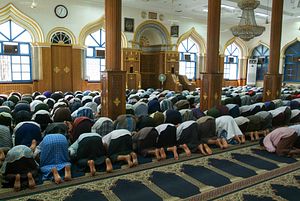Myanmar’s nationalist Buddhist group known as The Committee for the Protection of Nationality and Religion (Ma Ba Tha) has suddenly found itself losing support from government officials and the online community.
First, Yangon Region Chief Minister U Phyo Min Thein boldly declared in public that Ma Ba Tha is “unnecessary and redundant” since there is already a government agency tasked to oversee the activities of Buddhism in the country. This is the first time that a government official has dared to speak out against the influential Buddhist group.
The statement of the Yangon chief minister was confirmed by Sangha Maha Nayaka (Ma Ha Na), the state Buddhist authority. It added that Ma Ba Tha is not a recognized Buddhist group. None of Ma Ha Na’s 47 committee members has come forward to dispute this surprise revelation. Before this clarification, everybody in Myanmar assumed that Ma Ba Tha was operating with state authorization.
Then, Religious Affairs Minister Thura U Aung Ko warned leaders of Ma Ba Tha that they should stop endorsing hate speech or else they could face legal prosecution.
Since its founding in 2014, Ma Ba Tha has gained notoriety as a radical and nationalist Buddhist group whose anti-Muslim activities have inflamed religious hatred across Myanmar. But no politician or agency has denounced the racism and bigotry of Ma Ba Tha. This allowed Ma Ba Tha’s controversial leader, U Wirathu, to spread malicious information about Muslims in public assemblies and most especially on Facebook.
Responding to the anti-Ma Ba Tha statements of several civil servants, Wirathu urged the ruling party, the National League for Democracy, to take action and reprimand its officials.
But NLD spokesperson U Win Htein ignored Wirathu’s demand. “Religion and politics must be divided. We will not stand for using religion for political benefit, or mixing religion and politics in any way. So we will not follow whatever they demand,” the spokesperson asserted.
Ma Ba Tha even threatened to organize a series of nationwide protests if the government will not censure the Yangon chief minister.
Before the NLD-led government could reply, Myanmar’s online community flooded the cyberspace with the hashtag #NoMaBaTha reflecting the popular rejection of the radical Buddhist group. Some even anticipated the “inevitable” fall of the group through funny memes.
Ma Ba Tha eventually canceled the planned protest action by claiming that the sentiment of the Yangon chief minister does not represent the official position of the government. It also insisted that it is “organized under the authority of Ma Ha Na, and it was approved and accepted by the All Order Sangha Conference in 2013.”
But the legal woes of Ma Ba Tha is far from over. A charity group called Thet Daw Saunt (Bodyguard) has filed a defamation lawsuit against Wirathu for insulting a United Nations official in 2015. The UN special rapporteur on human rights in Myanmar merely highlighted the plight of the persecuted Rohingya ethnic group but it provoked Wirathu to call the official a “whore” in a public meeting.
That Ma Ba Tha and Wirathu would be held accountable for promoting hate speech was unthinkable a year ago. They represented a powerful bloc in the military-backed government which successfully lobbied for the passage of several laws described by some experts as discriminatory to the Muslim minority.
Ma Ba Tha is the same group which organized a protest in front of the United States Embassy because of a statement issued by the latter offering sympathies to the families of Rohingya boat refugees who drowned in an accident.
Are we seeing the last days of Ma Ba Tha? That’s probably premature. After all, the anti-Rohingya opinion is also shared by some NLD officials. What is certain is that Ma Ba Tha will remain ferocious in its crusade to stopping the so-called Muslim plot to dominate Buddhist Myanmar.
And Wirathu will not be Wirathu if he ceases hurling invectives against his perceived enemies. Last week, he even called NLD leader and Nobel Laureate Aung San Suu Kyi a “woman dictator.”
Myanmar’s new government has several disappointing moments as it marks its first 100 days in power. But the initiative of some officials to curb hate speech and religious intolerance by rejecting the Buddhist hardliners is laudable

































